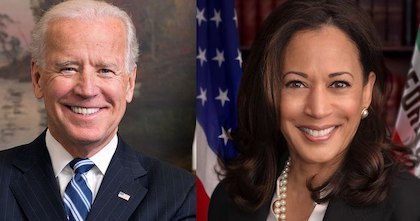President-elect Biden and Vice President-elect Harris.
Africa’s oldest political party, the African National Congress (ANC) hopes the administration of U.S. President-elect Joe Biden will lift sanctions on Zimbabwe and take a more respectful and well–measured diplomatic position toward Africa that will restore links with the continent and the rest of the world.
Speaking at campaign a rally recently in Johannesburg, ANC secretary-general Ace Magashule expressed some optimism that Biden will discontinue the intense trade and diplomatic rows instigated by Trump with most countries across the globe. “The US should not dictate how other countries run their affairs,” he said. “They must also understand that they can’t be telling the world what to do.”
In a congratulatory message to the U.S. Vice President-elect Kamala Harris, the first African American and Indian American, and first female, to clinch the powerful post, the ANC Women’s League (ANCWL) also weighed in, calling for an end to sanctions and imperialism. “Harris as the Vice-President of the U.S. must be the voice of reason against White supremacy, patriarchy and male chauvinism in the U.S. and across the globe,” the ANCWL secretary general Meokgo Matuba said in a statement. “Serving under President Joe Biden, she must also be at the frontline to fight against imperialism and among others call for an end to the illegal occupation of Palestine land by Israel, an end of sanctions against Zimbabwe, Cuba and many other countries.”
As a U.S. senator, Biden once called the South African apartheid government a “repulsive, repugnant regime.” It was 1986, when Biden confronted then U.S. secretary of state George Shultz, about the American policy of “constructive engagement” which essentially coddled the White minority government.
Biden said: “Our loyalty is not to South Africa, it’s to South Africans and the South Africans are majority Black and they are being excoriated. It’s not to some stupid puppet government over there. It’s not the Afrikaners regime. We have no loyalty to them.” Biden said South Africans had tried every means to oppose apartheid and had failed “and now they are taking up arms.”
Most Africans cautiously welcomed Biden’s victory as an avenue of possible relief from the stifling and maximum pressure policy of incumbent President Donald Trump. They hope Biden’s presidency will bring an era of more diplomacy and less bullying and erratic decisions. The Southern African Development Community (SADC) countries and the African Union (AU) have rallied together to call for the unconditional removal of sanctions that the U.S., U.K. and their western allies imposed on Zimbabwe almost two decades ago. Zimbabwe is pursuing an open engagement policy to end hostilities with the western countries that erupted when the southern African nation embarked on a land reform policy to redistribute land to the landless majority.
Political commentators all agree that Trump effectively ignored the continent, at best, and insulted it at worst. They also hope that Biden will play a key role in charting a diplomatic pathway between Washington and Africa that will bring big policy shifts, open new possibilities and opportunities.
“Biden’s promise to reengage with world is a welcome move. We are, however, neither naive nor complacent,” Amy Niang, a professor of international relations in Senegal told local media. “Africa needs investment and technology transfer to build infrastructure, to mechanize its agriculture and create jobs for its youth. We therefore expect him to engage Africa as a serious trade and investment partner and a pivotal actor in global politics. We urge him to take [a] cue from the African Union and to work closely with the continental institution to elaborate policies that are mutually beneficial.”
Brian Kagoro, a Zimbabwean lawyer and political commentator, said, “Africa is way ahead of the U.S. in many respects. We have had two female presidents, several female ministers of defense and finance as well as female vice presidents, while it took 243 years for the U.S. to elect its first woman vice president. Without a structured engagement by the collective African leadership, it is safe to say hope lies in three things: who Biden appoints as secretary of state and secretary for Africa, respectively, how the Harris effect plays out in handling global affairs as well as issues pertaining to people of color, human rights and migration; [and] where and how Biden and Harris choose their priorities and investments.”
Other African political and social commentators still doubt if U.S.—Africa relationship will change dramatically. Still, dealing with Biden will be a huge improvement from Trump’s total disrespect and contempt for Africa, Africans and non-White peoples.
They say Trump’s absence from the global political stage will not be missed. Some hailed the U.S. election for expressing the will of voters despite Trump’s spirited campaign to extinguish the flame of democracy.
The African commentators hope the Biden presidency restores the spirit of multilateralism and uphold democratic values and human rights in its relations with Africa and the world. The multilateralism, they say, can translate into more cooperation with the African Continental Free Trade Area, the African Union Development Agency, the Africa Centers for Disease Control and Prevention, and an array of bilateral and reciprocal trade agreements.
Some commentators also want Biden to remove protectionist impulses contained in the U.S. African Growth and Opportunity Act (AGOA) trade arrangement and for the U.S. to return to the World Health Organization (WHO) and the Paris Agreement on climate.
Time will show if and when the shift occurs from Trump’s “America First” policy to “The World Together,” approach.
Sifelani Tsiko is a veteran journalist based in Harare, Zimbabwe Sifelani11@gmail.com








